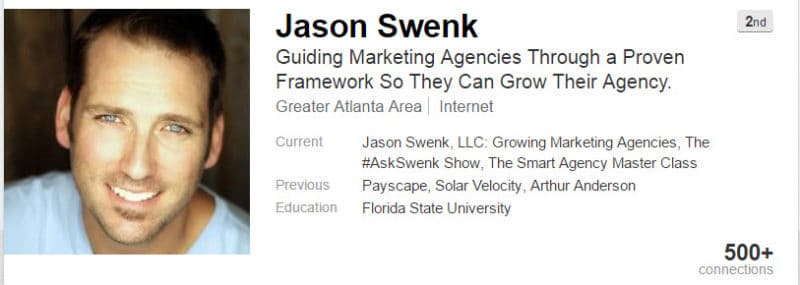Case Study #2: What to Be Aware of in an Earnout
 In 2012 Jason Swenk sold his digital advertising agency, Solar Velocity.
In 2012 Jason Swenk sold his digital advertising agency, Solar Velocity.
Solar velocity helped with websites and web applications for brands like Aflac, Coke, and LegalZoom. At the time, he took 50% of the sale in upfront cash and took the remainder in a 50% earnout.
What is an earnout?
An earnout is another way for a seller of a business to receive payment that is based on future performance of that sold business.
Why do some buyers offer them?
Sometimes they lack the cash or capital to buy the business for the entirety of the selling price, so asking the seller to, in a way, finance the deal through an earnout is a strategy. Many times there may be some skepticism as to the viability of the firm without the seller in position, the business may have customer concentration issues, or are using aggressive projections, so this helps “steady the ship” during the transition time as the seller is incentivized to do what he can to make his earnout provisions.
Why did Jason decide to sell the business in the first place?
It had been 12 years in the making, and at the $10M revenue milestone, he knew that the next level for the business would be $50M, and he didn’t have the desire to push on to that level. He wanted to do something new.
What were the terms of his earnout?
He had to stay on for two years and the company needed to hit certain markers throughout that time.
What went wrong?
The company that acquired Jason’s company was itself acquired nine months after Jason sold. The new company then construed the earnout timelines across those 9 months instead of the 24 in the original agreement, and he didn’t get any of the earnout.
The major failure here was from Jason’s lawyer and M&A firm that didn’t foresee the possibility of another acquisition and how the terms of the earnout would survive in such a transaction. That’s why it is so critical not only to get help in structuring your deal, but to think about every possibility, particularly in an earnout.
Before that, however, you must realize that when you’re bought, you no longer control the reins of leadership in the company, and when you make suggestions which will improve the likelihood of your targets being hit, those suggestions may be disregarded. Even if you have yourself covered on the contract side, you can’t control how management will work with you.
So if you have to do an earnout, what should you consider?
Given this experience, it’s not hard to imagine that Jason’s policy is “no more earnouts” should he sell a business in the future. But what if an earnout is part of a deal you are involved in? You should realize that the best earnouts provide incentives for the buyer, not just the seller. If you can make it equally beneficial for a buyer to hit an earnout marker, they may stay on the front lines with the seller to make sure those targets get hit.
And, as we noted above, make sure that you account for every circumstance during the earnout, including an acquisition of your acquirer.
Words of Wisdom
Jason’s gone on to bigger and better things since the sale, including authoring a book and creating a smartphone app, so this case study isn’t solely a cautionary tale. “Build to sell, but treat your business like you never will” and “The grass is greener…on the side you water!” are quotes that indicate that Jason is the sort of person who learns from his mistakes. We hope you will learn his lesson, so you don’t have to re-learn it on your own.
To learn more about Jason, Solar Velocity, and this sale, click here.



